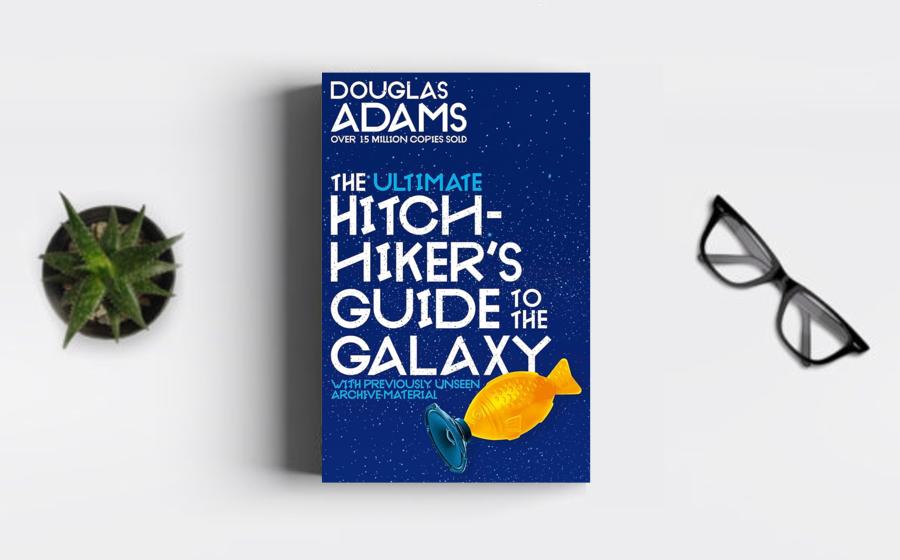Douglas Adams' "The Hitchhiker's Guide to the Galaxy"
stands as a magnum opus, a comedic and philosophical
journey through space that transcends the boundaries of
conventional storytelling. As we embark on this
interstellar adventure, it becomes evident that "The
Hitchhiker's Guide" is not merely a space-faring tale;
it is a satirical exploration of the absurdities of
existence, a cosmic comedy that has earned its esteemed
place among the top books of all time.
At the heart of "The Hitchhiker's Guide to the
Galaxy" is the narrative of Arthur Dent, an unwitting
Earthling rescued just before the demolition of his
planet to make way for a hyperspace bypass. In a manner
reminiscent of literary quests that thrust unsuspecting
characters into extraordinary circumstances, Adams'
narrative becomes a thematic tapestry, a cosmic comedy
that invites readers to revel in the hilarity of the
absurd.
In the tradition of literary quests that
propel characters into unexpected adventures, Adams'
exploration of Arthur Dent's interstellar journey
becomes a cosmic odyssey, an epic that propels readers
into the whimsical tapestry of science fiction satire.
"The Hitchhiker's Guide" transforms into a comedic space
opera, where the absurdities of existence become a
thematic motif that sets the stage for an exploration of
the infinite and the ordinary. Adams' narrative becomes
a comic tapestry, weaving together threads of humor,
philosophy, and the sheer randomness of the universe.
Adams introduces the concept of the
Infinite Improbability Drive, a propulsion system that
allows spaceships to travel between points in the
universe with an infinitesimally small probability. In
the tradition of literary devices that defy the laws of
physics, the Infinite Improbability Drive becomes a
thematic undercurrent that defines the science fiction
landscape of "The Hitchhiker's Guide." The absurdity of
improbability becomes a narrative device, inviting
readers to embrace the chaotic and unpredictable nature
of the cosmos.
The Infinite Improbability Drive
becomes a science fiction motif that resonates with the
literary tradition of exploring fantastical
technologies. Adams' insights add layers of meaning to
the text, transforming "The Hitchhiker's Guide" into a
space-faring comedy where the absurdity of improbability
becomes a central theme. Readers are prompted to
contemplate the unpredictable nature of the universe and
the sheer randomness that shapes cosmic destinies.
The
phrase "Don't Panic" adorns the cover of the titular
guidebook, a mantra that encapsulates the essence of
survival in the vastness of the galaxy. In the tradition
of literary mantras that offer wisdom to characters,
"Don't Panic" becomes a thematic thread that runs
through "The Hitchhiker's Guide." The zen of galactic
survival becomes a narrative device, inviting readers to
adopt a lighthearted and resilient approach to the
absurdities of existence.
"Don't Panic" becomes a
literary mantra that resonates with the tradition of
offering sage advice to characters embarking on
adventures. Adams' exploration adds depth to the text,
transforming "The Hitchhiker's Guide" into a comedic
novel where the philosophy of not panicking becomes a
central theme. Readers are encouraged to embrace the
chaos of the universe with a sense of humor and a
resilient spirit.
Adams satirizes the concept
of Vogon poetry, an excruciating form of artistic
expression known for its unbearable awfulness. In the
tradition of literary satires that lampoon artistic
pretensions, Vogon poetry becomes a thematic tapestry
that weaves through "The Hitchhiker's Guide." The
absurdity of artistic creation becomes a narrative
device, inviting readers to reflect on the subjective
nature of art and the comedic potential within creative
endeavors.
Vogon poetry becomes a satirical motif
that resonates with the literary tradition of poking fun
at highbrow artistic pursuits. Adams' exploration adds a
layer of humor to the text, transforming "The
Hitchhiker's Guide" into a comedic novel where the
absurdity of Vogon poetry becomes a central theme.
Readers are prompted to consider the arbitrary judgments
of artistic quality and the potential for humor within
the realm of creativity.
Adams
introduces the Pan-Galactic Gargle Blaster, a concoction
renowned for being the best drink in existence, known
for inducing a state of "mild euphoria." In the
tradition of literary libations that capture the
imagination, the Pan-Galactic Gargle Blaster becomes a
thematic undercurrent that defines the interstellar pub
scenes in "The Hitchhiker's Guide." The absurdity of the
perfect drink becomes a narrative device, inviting
readers to revel in the fantastical possibilities of
concoctions across the cosmos.
The Pan-Galactic
Gargle Blaster becomes a science fiction libation that
resonates with the literary tradition of creating
imaginative beverages. Adams' insights add a layer of
whimsy to the text, transforming "The Hitchhiker's
Guide" into a comedic novel where the absurdity of
interstellar libations becomes a central theme. Readers
are encouraged to appreciate the fantastical and enjoy
the humor inherent in the diverse libations offered by
the galaxy.
Adams introduces the concept of
the supercomputer Deep Thought, designed to calculate
the answer to the ultimate question of life, the
universe, and everything. The answer, revealed as the
number 42, becomes a symbol of the absurdity of seeking
a singular meaning in the vastness of existence. In the
tradition of literary symbols that encapsulate profound
truths, the number 42 becomes a thematic tapestry that
weaves through "The Hitchhiker's Guide." The absurdity
of the ultimate question becomes a narrative device,
inviting readers to ponder the elusive nature of meaning
in the cosmic scheme.
The answer to the ultimate
question becomes a philosophical motif that resonates
with the literary tradition of exploring existential
inquiries. Adams' exploration adds depth to the text,
transforming "The Hitchhiker's Guide" into a comedic
novel where the absurdity of seeking a singular meaning
becomes a central theme. Readers are prompted to
contemplate the inherent complexity of life's inquiries
and the potential for humor within the quest for
understanding.
Douglas Adams' cosmic opus is more than a science fiction romp; it is a symphony of cosmic comedy that harmonizes the concepts of the Infinite Improbability Drive, "Don't Panic," Vogon poetry, the Pan-Galactic Gargle Blaster, the answer to the ultimate question, and the overarching absurdity of existence.






